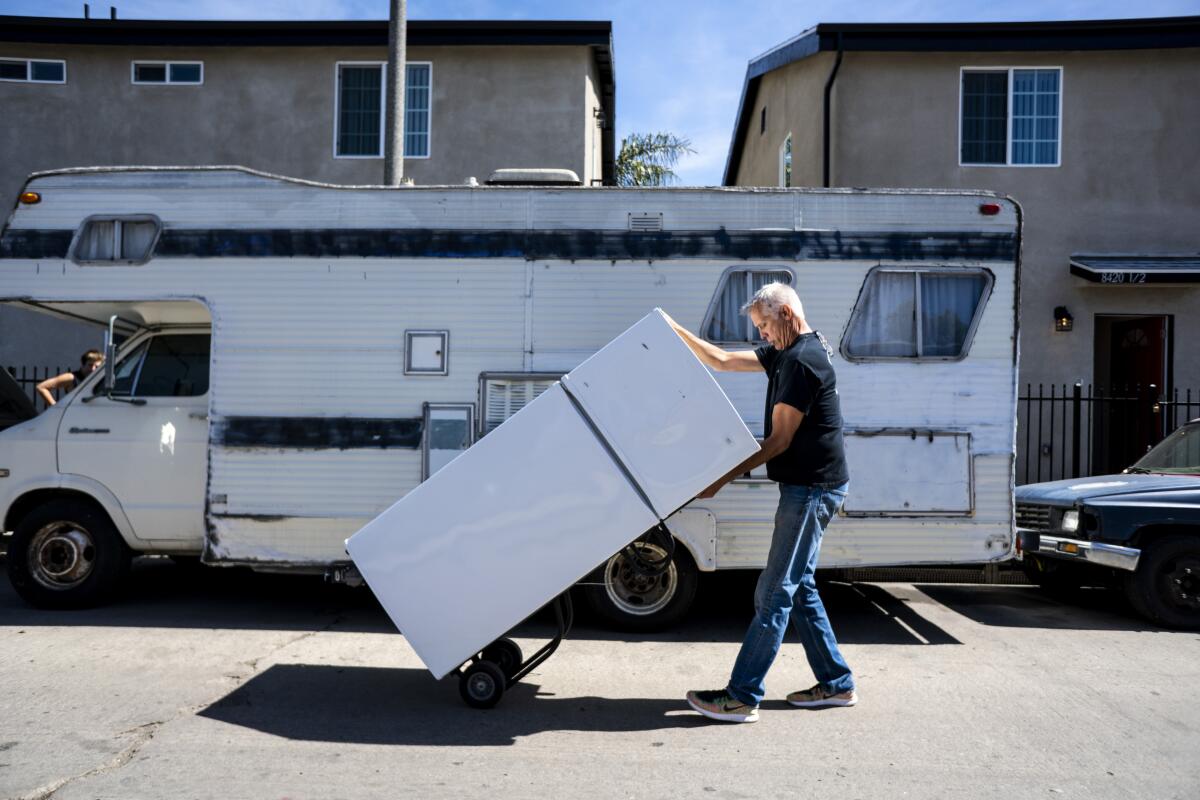Commentary: A housing crisis may be the next chapter in the coronavirus saga

- Share via
“That’s one of the remarkable things about life. It’s never so bad that it can’t get worse.” A quick Google search attributes that sentiment to everyone from Humphrey Bogart, to the Calvin and Hobbes comics — but it’s also a feeling shared by everyone living through the roller-coaster that has been 2020.
Though the economic, physical and mental health impacts have not been felt equally in our communities, no one has been left completely untouched by the COVID-19 pandemic. Which is perhaps why we have seen a massive rallying of the public and private sector to support people through this crisis. Eviction and mortgage moratoriums, expanded unemployment benefits and scaled-overnight food distribution programs meant that for the last few months most people have been able to keep a roof over their head, with enough food in the cupboard and money left over to keep the lights and Wi-Fi on. This doesn’t mean the past few months have not been extremely hard, but the social safety net we’ve consistently underfunded for decades reappeared to stave off the worst of the economic impacts, in hopes that it would allow us to adequately address the public health crisis looming in front of us.
Four months later, even as COVID-19 cases and hospitalizations are continuing to rise, the social safety net that has kept many afloat is beginning to fade. Expanded unemployment benefits are set to expire at the end of July, and many of the eviction protections and mortgage moratoriums have already disappeared, with many courts in California, including Orange County, resuming evictions that had been paused since March.
This context is necessary to understand this key point: This is the moment we have been asked to meet. Not the last four months, but this moment.
As someone who has dedicated 30 years of my career to building affordable homes for seniors, veterans and families across California, I’m acutely aware of how unprepared we are to address the housing crisis that is so intricately tied to us successfully managing this public health crisis. When our public officials are stressing the importance of staying home as often as possible, it forces us to address just how unstable the concept of home is for millions of Californians.
The year 2018 was the first that the state’s average median income returned to pre-Great Recession levels — in layman’s terms, the average California resident was finally “catching up.” However, this short economic recovery window, coupled with rising rent and home prices, means that most Californians weren’t saving for a rainy day — let alone a rainy year. It’s estimated that only 23.7% of California households have sufficient enough savings to survive at the poverty level for three months without any income — that means over 75% of Californians can’t. They’re also the ones most likely to be going without a stable income right now, dependent on fading government and private social programs.
To their credit, our state Legislature and governor reaffirmed their commitment to addressing California’s housing crisis by funding key housing programs in the recently passed state budget. But a cloud looms, with so much of the state budget tied to the action, or lack of action, being taken in Washington, D.C. As the federal government continues its deadlock over additional COVID-19 relief, our local, county and state governments are left with dwindling options when it comes to helping the vast majority of Californians maintain their housing. The House of Representative’s HEROES Act, or the recently passed Moving Forward Act, an infrastructure bill that would increase affordable housing production dramatically, while also creating new, local jobs in our community, are good places to start.
Regardless of the specific piece of legislation, Congress must recognize that responding to the looming housing crisis — which will involve addressing rental and mortgage payments, as well as the overall housing supply — is the only way to functionally address COVID-19 as we wait for a vaccine and other medical therapies.
It’s never so bad that it can’t get worse. Let’s make this moment a movement that solves our housing and public health crisis for future generations.
The writer is an Orange County resident and serves as President and CEO of Jamboree Housing Corp., California’s largest nonprofit affordable housing developer.
All the latest on Orange County from Orange County.
Get our free TimesOC newsletter.
You may occasionally receive promotional content from the Daily Pilot.



